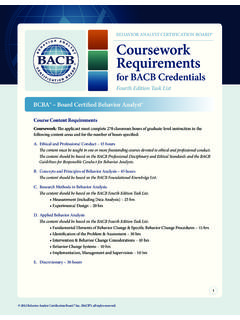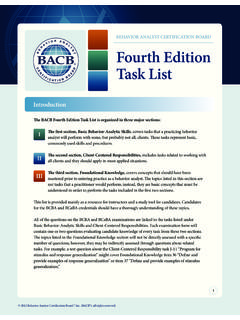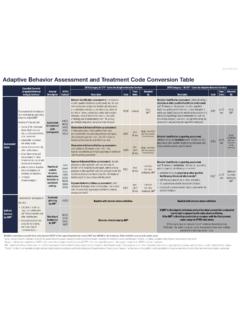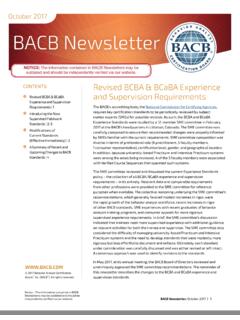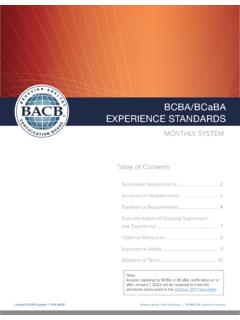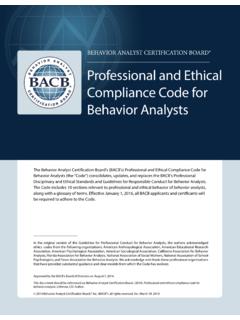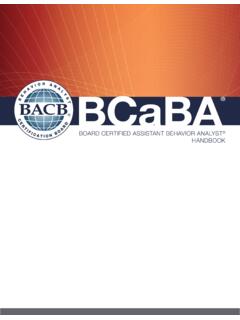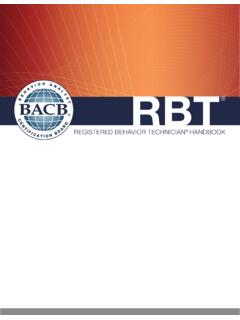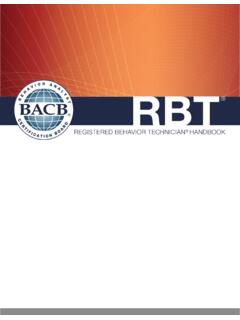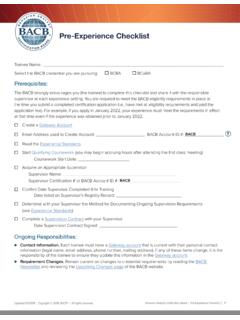Transcription of Ethics Code for Behavior Analysts
1 Ethics Code for Behavior AnalystsThe Ethics Code for Behavior Analysts (Code) replaces the Professional and Ethical Compliance Code for Behavior Analysts (2014). All BCBA and BCaBA applicants and certificants are required to adhere to the Code effective January 1, document should be referenced as: Behavior Analyst Certification Board. (2020). Ethics code for Behavior Analysts . Littleton, CO: 2020, BACB , All rights Analyst Certification Board | Ethics Code for Behavior Analysts | 2 Updated 09/2021, Copyright 2020, BACB | All rights of ContentsIntroduction ..3 Scope of the Code ..3 Core principles ..4 Application of the Code ..5 Enforcement of the Code ..6 Glossary ..7 Ethics Standards ..9 Section 1 Responsibility as a Professional .. Being Truthful .. Conforming with Legal and Professional Practicing within a Defined Role .. Practicing within Scope of Competence .. Maintaining Competence .. Cultural Responsiveness and Diversity.
2 Nondiscrimination .. Nonharassment .. Awareness of Personal Biases and Challenges .. Multiple Relationships .. Giving and Receiving Gifts .. Coercive and Exploitative Relationships .. Romantic and Sexual Responding to Requests .. Self-Reporting Critical Information ..10 Section 2 Responsibility in Practice .. Providing Effective Timeliness .. Protecting Confidential Information .. Disclosing Confidential Information .. Documentation Protection and Retention .. Accuracy in Service Billing and Reporting .. Fees .. Communicating About Services .. Involving Clients and Stakeholders .. Collaborating with Colleagues .. Obtaining Informed Consent .. Considering Medical Needs .. Selecting, Designing, and Implementing Assessments .. Selecting, Designing, and Implementing Behavior - Change Interventions .. Minimizing Risk of Behavior -Change Interventions .. Describing Behavior -Change Interventions Before Implementation .. Collecting and Using Data.
3 Continual Evaluation of the Behavior -Change Intervention .. Addressing Conditions Interfering with Service Delivery ..12 Section 3 Responsibility to Clients and Stakeholders .. Responsibility to Identifying Stakeholders .. Accepting Service Agreement .. Financial Agreements .. Consulting with Other Providers .. Third-Party Contracts for Services .. Responsibility to the Client with Third-Party Contracts for Services .. Communicating with Stakeholders About Third-Party Contracted Services .. Limitations of Confidentiality .. Documenting Professional Activity .. Advocating for Appropriate Services .. Referrals .. Facilitating Continuity of Services .. Appropriately Discontinuing Services .. Appropriately Transitioning Services ..14 Section 4 Responsibility to Supervisees and Trainees .. Compliance with Supervision Requirements .. Supervisory Competence .. Supervisory Volume .. Accountability in Supervision .. Maintaining Supervision Documentation.
4 Providing Supervision and Training .. Incorporating and Addressing Diversity .. Performance Monitoring and Feedback .. Delegation of Tasks .. Evaluating Effects of Supervision and Training .. Facilitating Continuity of Supervision .. Appropriately Terminating Supervision ..16 Section 5 Responsibility in Public Statements .. Protecting the Rights of Clients, Stakeholders, Supervisees, and Trainees .. Confidentiality in Public Statements .. Public Statements by Behavior Public Statements by Others .. Use of Intellectual Property .. Advertising Nonbehavioral Services .. Soliciting Testimonials from Current Clients for Advertising .. Using Testimonials from Former Clients for Advertising .. Using Testimonials for Nonadvertising Purposes .. Social Media Channels and Websites .. Using Digital Content in Public Statements ..17 Section 6 Responsibility in Research .. Conforming with Laws and Regulations in Research .. Research Review.
5 Research in Service Delivery .. Informed Consent in Research .. Confidentiality in Competence in Conducting Research .. Conflict of Interest in Research and Publication .. Appropriate Credit .. Plagiarism .. Documentation and Data Retention in Research .. Accuracy and Use of Data ..18 Behavior Analyst Certification Board | Ethics Code for Behavior Analysts | 3 Updated 09/2021, Copyright 2020, BACB | All rights a diverse group of professionals who work in a variety of practice areas, Behavior Analysts deliver applied Behavior analysis (ABA) services to positively impact lives. The Behavior Analyst Certification Board (BACB ) exists to meet the credentialing needs of these professionals and relevant stakeholders ( , licensure boards, funders) while protecting ABA consumers by establishing, disseminating, and managing professional standards. The BACB facilitates ethical Behavior in the profession through its certification eligibility and maintenance requirements, by issuing the Ethics standards described in this document, and by operating a system for addressing professional Ethics Code for Behavior Analysts (Code) guides the professional activities of Behavior Analysts over whom the BACB has jurisdiction (see Scope of the Code below).
6 The Code also provides a means for Behavior Analysts to evaluate their own Behavior and for others to assess whether a Behavior analyst has violated their ethical obligations. An introduction section describes the scope and application of the Code, its core principles , and considerations for ethical decision making. The core principles are foundational concepts that should guide all aspects of a Behavior analyst s work. The introduction is followed by a glossary that includes definitions of technical terms used in the Code. The final section includes the Ethics standards, which are informed by the core principles . The standards are organized into six sections: 1) Responsibility as a Professional, 2) Responsibility in Practice, 3) Responsibility to Clients and Stakeholders, 4) Responsibility to Supervisees and Trainees, 5) Responsibility in Public Statements, and 6) Responsibility in of the CodeThe Code applies to all individuals who hold Board Certified Behavior Analyst (BCBA ) or Board Certified Assistant Behavior Analyst (BCaBA ) certification and all individuals who have completed an application for BCBA or BCaBA certification.
7 For the sake of efficiency, the term Behavior analyst is used throughout this document to refer to those who must act in accordance with the Code. The BACB does not have separate jurisdiction over organizations or corporations. The Code applies to Behavior Analysts in all of their professional activities, including direct service delivery, consultation, supervision, training, management, editorial and peer-review activities, research, and any other activity within the ABA profession. The Code applies to Behavior Analysts professional activities across settings and delivery modes ( , in person; in writing; via phone, email, text message, video conferencing). Application of the Code does not extend to Behavior Analysts personal Behavior unless it is determined that the Behavior clearly poses a potential risk to the health and safety of clients, stakeholders, supervisees, or trainees. Specific terms are defined in the Glossary section; however, two definitions are provided here because they are frequently used in the Core principles section.
8 Client: The direct recipient of the Behavior analyst s services. At various times during service provision, one or more stakeholders may simultaneously meet the definition of client ( , the point at which they receive direct training or consultation). In some contexts, the client might be a group of individuals ( , with organizational Behavior management services). Stakeholder: An individual, other than the client, who is impacted by and invested in the Behavior analyst s services ( , parent, caregiver, relative, legally authorized representative, collaborator, employer, agency or institutional representative, licensure board, funder, third-party contractor for services). Behavior Analyst Certification Board | Ethics Code for Behavior Analysts | 4 Updated 09/2021, Copyright 2020, BACB | All rights principles Four foundational principles , which all Behavior Analysts should strive to embody, serve as the framework for the Ethics standards.
9 Behavior Analysts should use these principles to interpret and apply the standards in the Code. The four core principles are that Behavior Analysts should: benefit others; treat others with compassion, dignity, and respect; behave with integrity; and ensure their own Benefit Others. Behavior Analysts work to maximize benefits and do no harm by: Protecting the welfare and rights of clients above all others Protecting the welfare and rights of other individuals with whom they interact in a professional capacity Focusing on the short- and long-term effects of their professional activities Actively identifying and addressing the potential negative impacts of their own physical and mental health on their professional activities Actively identifying potential and actual conflicts of interest and working to resolve them in a manner that avoids or minimizes harm Actively identifying and addressing factors ( , personal, financial, institutional, political, religious, cultural) that might lead to conflicts of interest, misuse of their position, or negative impacts on their professional activities Effectively and respectfully collaborating with others in the best interest of those with whom they work and always placing clients interests first2.
10 Treat Others with Compassion, Dignity, and Respect. Behavior Analysts behave toward others with compassion, dignity, and respect by: Treating others equitably, regardless of factors such as age, disability, ethnicity, gender expression/identity, immigration status, marital/relationship status, national origin, race, religion, sexual orientation, socioeconomic status, or any other basis proscribed by law Respecting others privacy and confidentiality Respecting and actively promoting clients self-determination to the best of their abilities, particularly when providing services to vulnerable populations Acknowledging that personal choice in service delivery is important by providing clients and stakeholders with needed information to make informed choices about services3. Behave with Integrity. Behavior Analysts fulfill responsibilities to their scientific and professional communities, to society in general, and to the communities they serve by: Behaving in an honest and trustworthy manner Not misrepresenting themselves, misrepresenting their work or others work, or engaging in fraud Following through on obligations Holding themselves accountable for their work and the work of their supervisees and trainees, and correcting errors in a timely manner Being knowledgeable about and upholding BACB and other regulatory requirements Actively working to create professional environments that uphold the core principles and standards of the Code Respectfully educating others about the Ethics requirements of Behavior Analysts and the mechanisms for addressing professional misconduct4.
